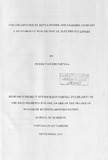| dc.contributor.author | Njenga, Peter W | |
| dc.date.accessioned | 2013-03-01T11:35:22Z | |
| dc.date.issued | 2011-09 | |
| dc.identifier.uri | http://erepository.uonbi.ac.ke:8080/xmlui/handle/123456789/13006 | |
| dc.description.abstract | Electricity is one of the major drivers of the economy and is one of the prime movers of the
modern sector of the economy in Kenya’s vision 2030. Electricity is the most sought after
energy source by Kenyan society. The energy sector in Kenya has long been facing the gigantic
problem of Non-technical electricity losses. The existing law governing the electricity sector is
insufficient to control the causes of Non-technical electricity losses. There exists therefore a dire
need for a whole set of strategies to reduce the Non-technical electricity losses.
The purpose of the study was to investigate the strategies used by the Kenya Power & Lighting
Company Ltd to reduce non-technical electricity losses. The objectives of the study were to
establish the various strategies used by the Kenya Power & Lighting Company to reduce nontechnical
electricity losses and also to establish the factors that influence non-technical
electricity losses in the company. The study used the case study design to gather qualitative data
using an interview guide and it focused on the Kenya Power & Lighting Company. Secondary
data from the company reports including the strategic plan reports was also incorporated. The
primary data upon being cleaned and presented according to the study themes was analyzed
through content analysis (qualitative analysis).
The findings suggested that customers are involved in causing Non-technical electricity losses
and sometimes this is facilitated by Kenya power employees. The company has adopted several
technologies and operational strategies to reduce the Non-technical electricity losses. It is
recommended that the company should adopt more recent and efficient technologies to reduce
Non-technical electricity losses and consider bulk metering for the informal settlement areas.
The company should also involve the major stakeholders in power supply in order to be more
successful as well as carry out intensive training to enhance skills and integrity values. | en |
| dc.description.sponsorship | University of Nairobi | en |
| dc.language.iso | en | en |
| dc.subject | Kenya power and lighting company | en |
| dc.subject | Non-technical electricity | en |
| dc.title | Strategies Used by Kenya Power and Lighting Company Ltd to Reduce Non-technical Electricity Losses | en |
| dc.type | Thesis | en |
| local.publisher | School of business | en |

